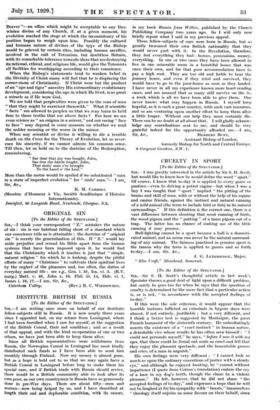DESTITUTE BRITISH IN RUSSIA
[To the Editor of the SPECTATOR.] SIR,—I am writing once more on behalf of our destitute fellow-subjects still in Russia. It is now nearly three years since I appealed last, on my return from Leningrad, where I had been horrified when I saw for myself, at the suggestion of the British Consul, their sad condition ; and as a result of that appeal, and with the kind co-operation of one or two others, we have just been able to keep them alive.
Since all British representatives were withdrawn from Russia, the Norwegian Consul in Leningrad has most kindly distributed such funds as I have been able to send him monthly through Finland. Now my money is almost gone, but as a hope is held out to us that we may again have a British Consul in Leningrad before long to make them his special care, and if British trade with Russia should revive, there would be a British community able to look after its own poor, as our own countrymen in Russia have so generously done in pre-War days. There are about fifty—men and women—now being helped by us, and I have described at length their sad and deplorable condition, with its causes, in my book Russia from Within, published by the Church Publishing Company two years ago. So I will only now briefly repeat what I said in my previous appeal.
These fellow-subjects of ours were born in Russia, but so greatly treasured their own British nationality that they would never part with it. In the Revolution, therefore, they lost everything they had—homes, possessions, money, everything. In one or two cases they have been allowed to live in one miserable room in a beautiful house that was once their own, and for that poor accommodation have to pay a high rent. They are too old and feeble to bear the journey home, and even if they tried and survived, they would have to go to the poor-house as soon as they landed. I have never in all my experience known more heart-rending cases, and am amazed that so many still survive on the 5s. a week which is all we have been able to give them. One never knows what may happen in Russia. I myself keep hopeful, as it is such a great country, with such vast resources, and so am venturing upon another effort to keep them alive a little longer. Without our help they must certainly die. There can be no doubt at all about that. I will gladly acknow- ledge any contributions sent to me, and should be very grateful indeed for the opportunity afforded me.—I am, Assistant Bishop of London, formerly Bishop for North and Central Europe. 8 Greycoat Gardens, S.W .1.
































 Previous page
Previous page